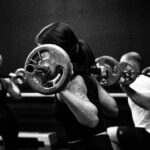The question of whether to eat before or after a workout is a topic of considerable debate within the fitness community. This article aims to provide a clear, evidence-based answer to help you make an informed decision.
Pre-Workout Nutrition: The Benefits
Consuming food before a workout can significantly impact your performance, particularly in high-intensity exercises. Pre-workout meals, especially those rich in carbohydrates, supply your body with glucose, the primary energy source for your muscles.
Scientific Evidence: Research published in the Journal of the International Society of Sports Nutrition indicates that carbohydrate intake before exercise can improve endurance and performance. This is particularly relevant for activities such as weightlifting, running, or cycling, where sustained energy is crucial.
However, it’s important to consider the timing and size of your meal. A heavy meal consumed too close to your workout can lead to discomfort and may impair performance. Ideally, a balanced meal should be eaten 2-3 hours before exercise. If time is limited, a light snack such as a banana or yogurt 30-60 minutes prior can be effective.
For more detailed guidelines on what to eat before workouts, visit Healthline’s guide to pre-workout nutrition.
Post-Workout Nutrition: Key to Recovery
Post-workout nutrition plays a critical role in muscle recovery and growth. After exercise, your muscles are particularly receptive to nutrients—a concept known as the “anabolic window.”
Scientific Evidence: Protein intake post-exercise is essential for repairing muscle fibers and promoting muscle protein synthesis. A study in the American Journal of Clinical Nutrition suggests that consuming 20-40 grams of protein post-workout optimizes muscle recovery. Additionally, carbohydrates help restore glycogen levels, aiding in quicker recovery.
Combining protein with carbohydrates in your post-workout meal or snack can enhance recovery and prepare your body for subsequent workouts. For specific post-workout meal ideas, check out Men’s Health on the best foods to eat after a workout.
Determining the Optimal Strategy
The decision to eat before or after a workout should be guided by your individual goals and circumstances. If you exercise early in the morning or several hours after your last meal, pre-workout nutrition can help sustain energy levels. Conversely, if you’ve recently eaten, prioritizing post-workout nutrition might be more advantageous.
Guidelines:
- Pre-Workout: Consider eating if it has been more than 3-4 hours since your last meal. Opt for easily digestible carbohydrates and a small amount of protein.
- Post-Workout: Focus on consuming a meal or snack containing both protein and carbohydrates within two hours after exercise to maximize recovery.
For more comprehensive insights, refer to the Mayo Clinic’s article on pre- and post-workout nutrition.
Contextual Considerations
It is essential to align your nutrition strategy with your specific fitness goals—whether they involve endurance, muscle growth, or general fitness. Additionally, individual responses to food intake vary, making it important to tailor your approach to what best suits your body’s needs.
Conclusion
There is no universal answer to whether you should eat before or after the gym. Both pre- and post-workout nutrition have distinct benefits that can support your fitness objectives. A balanced approach, based on personal goals and bodily responses, is recommended. Regularly evaluating and adjusting your nutrition strategy can help you optimize performance and recovery.
For more detailed and personalized advice, consider consulting a nutritionist or a fitness expert. You can also explore WebMD’s extensive resources on workout nutrition for further reading.



